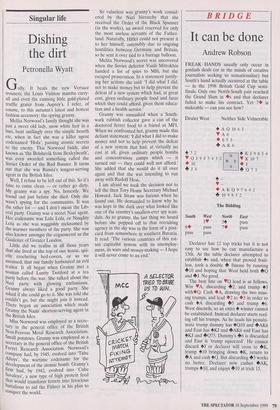Singular life
Dishing the dirt
Petronella Wyatt
Golly. It beats the new Versace trousers; the Louis Vuitton mamba carry- all and even the cunning little gold-plated truffle grater from Asprey's. I refer, of course, to this autumn's latest and hottest fashion accessory: the spying granny.
. Melita Norwood's family thought she was Just a sweet old lady, snow white hair in a bun, bent smilingly over the simple hearth etc, when in fact she was a killer agent codenamed `Flola', passing atomic secrets to the enemy. This Norwood biddy, also known as 'the Bolshevik from Bexleyheath', was even awarded something called the Soviet Order of the Red Banner. It turns out that she was Russia's longest-serving agent in the British Isles.
Well, I refuse to be left out of this. So it's time to come clean — or rather go dirty. My granny was a spy. No, honestly. We found out just before she died. Only she wasn't spying for the communists. It was the other lot — and I don't mean the Lib- eral party. Granny was a secret Nazi agent. Her codename was Lola Lola, or Naughty Lola as she was waggishly nicknamed by the warmer members of the party. She was also known amongst the cognoscenti as the Gauleiter of Greater London.
Little did we realise in all those years that she lived at the top of our house, qui- etly crocheting bed-covers, or so we assumed, that our family harboured an evil traitor. It all began when Granny met a woman called Lunity Twitford at a tea party before the war. She talked about the Nazi party with glowing enthusiasm. Granny always liked a good party. She asked if she could go to it. She was told she Couldn't go, but she might join it instead. There began an association which made Granny the Nazis' shortest-serving agent in the British Isles.
Miss Norwood was employed as a secre- tary in the general office of the British Non-Ferrous Metal Research Association. Small potatoes. Granny was employed as a secretary in the general office of the British Ferret Research Association. Norwood's company had, by 1945, evolved into `Tube Alloys', the wartime codename for the development of the atomic bomb. Granny's firm had, by 1942, evolved into 'Cube Savaloys', a new type of high protein feed that would transform ferrets into ferocious battalions to aid the Fiihrer in his plan to conquer the world. So valueless was granny's work consid- ered by the Nazi hierarchy that she received the Order of the Black Spanner (in the works), an award reserved for only the most useless servants of the Father- land. Naturally, Hitler could not present it to her himself, ostensibly due to ongoing hostilities between Germany and Britain, so he sent it over tied to a barrage balloon.
Melita Norwood's secret was uncovered when the Soviet defector Vasili Mitrokhin handed a list of spies to MI6, but she escaped prosecution. In a statement justify- ing her actions she said: 'I did what I did, not to make money but to help prevent the defeat of a new system which had, at great cost, given ordinary people food and fares which they could afford, given them educa- tion and a health service.'
Granny was unmasked when a South- wark rubbish collector gave a can of the doctored ferret food to a friend at MFI. When we confronted her, granny made this defiant statement: `I did what I did to make money and not to help prevent the defeat of a new system that had, at virtually no cost at all, given ordinary people bombs and concentration camps which — it turned out — they could well not afford.' She added that she would do it all over again and that she was intending to run away with Rudolf Hess.
I am afraid we took the decision not to tell the then Tory Home Secretary Michael Howard. Jack Straw was furious when he found out. He demanded to know why he was kept in the dark over what looked like one of the country's smallest-ever spy scan- dals. As to granny, the last thing we heard before she popped off to that recruiting agency in the sky was in the form of a post- card from somewhere in southern Bavaria. It read: 'The various countries of this rot- ten capitalist system with its unemploy- ment, its wars and money-making —1 hope it will never come to an end.'


























































































 Previous page
Previous page